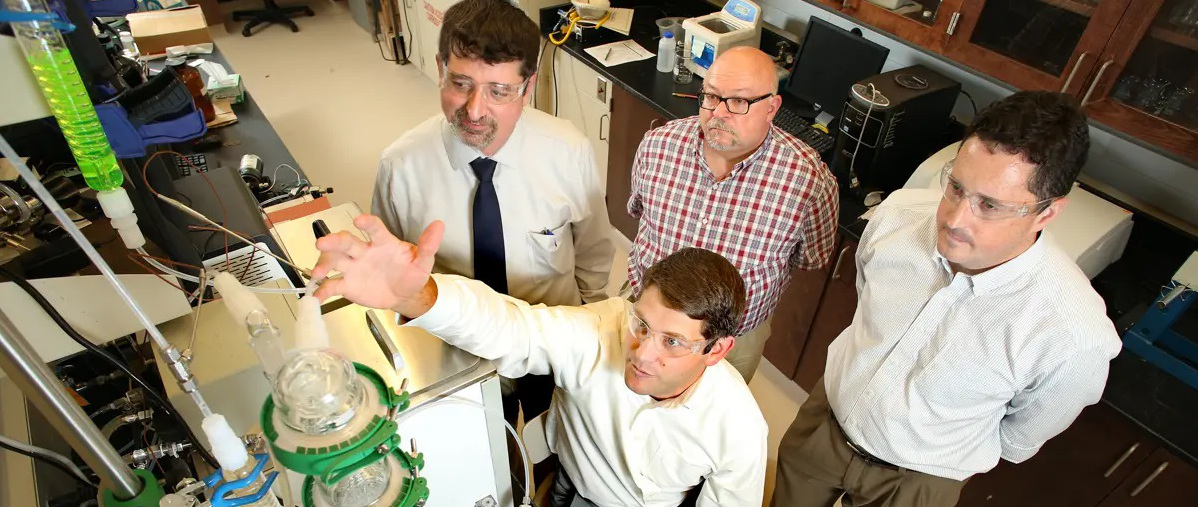South Alabama Ionic Liquids Laboratory (SAILL)

What are Ionic Liquids?
Ionic liquids are salts in a liquid state, and they are frequently referred to as “solvents of the future,” or “designer solvents” because of their potential to replace environmentally unfriendly liquids used to dissolve other substances.
SAILL, the South Alabama Ionic Liquids Laboratory, is made up of faculty from the Chemical Engineering and Chemistry departments at the University of South Alabama. The research cluster was formed in 2019 to carry out a two-year, $2.7 million EPSCoR award from the Department of Energy. The mission of SAIL is to become the preeminent center for ionic liquids research in the United States, focusing our research efforts on the design, synthesis and characterization of ionic liquids and the development and optimization of processes that utilize them. Through our research efforts, SAILL provides a framework that USA researchers and partner institutions can use to collaborate, exchange ideas, build research partnerships and leverage their talents to obtain the resources necessary to carry out world-class, cutting-edge research and development in the area of ionic liquids.
Current Research
- Boronium Ionic Liquids - Impact of Structure on Chemistry, Electrochemical Stability,
Ion Dynamics, and Charge Transport
Funded by the National Science Foundation
PI: James Davis - Stereolithography Printing of Components Incorporating Energetic Ionic Liquids
Funded by the U.S. Army Research Office
PI: W. Matthew Reichert - Understanding the Molecular-level Interactions Between Ionic Liquids and Molecular
Species to Design and Develop Novel Solvent Systems for Environmental and Energy Applications
Funded by the Department of Energy
PI: Kevin West - Development of CO2-Capturing Ionic Liquid Solutions for Spacecraft Air Revitalization Systems
Funded by the National Aeronautics and Space Administration
PI: James Davis
Publications
Rabideau, B. D.; West, K. N.; Davis, J. H. Making good on a promise: ionic liquids with genuinely high degrees of thermal stability. Chem. Commun., 2018, 54, 5019-5031. doi.org/10.1039/C8CC01716F
Press
Adjusting the Dance Tunes the Melt
South Awarded $3.8 Million for Ionic Liquid Research
Developing a Printer Worth Its Salt
Boronium Ionic Liquids - Impact of Structure on Chemistry, Electrochemical Stability, Ion Dynamics, and Charge Transport
PI JAMES DAVIS
This project involves the preparation and characterization of new Ionic liquids - salts in a liquid form - that are expected to have a high degree of stability towards electrical currents. As such, the new materials may find application as battery electrolytes superior in performance and safety to materials currently in use. The project is a collaborative effort with the US Naval Academy. USA will be responsible for the synthesis and routine characterization of the new materials, while the USNA will carry out all electrochemical facets of the work.
Energetics On-Demand: Stereolithography Printing of Components Incorporating Energetic Ionic Liquids
PI MATTHEW REICHERT
Work has focused on the creation of new energetic ionic liquid (EIL) monomers and plasticizers and their incorporation into SLA resins, ultimately culminating in the printing of 100% energetic polymer components. Synthesis of the base EILs used current literature methods for the nitration and amination steps, with “detours” along the synthetic path to introduce the alkenyl groups for free radical polymerization. Candidate EIL monomers, polymers, and plasticizers will be screened based on mechanical, thermal, and energetic properties. The former determined the drop hammer test for shock sensitivity and thermal degradation temperature found by thermogravimetric analysis (TGA). At the same time, the latter will include heat evolution using differential scanning calorimetry (DSC). In addition, ionic liquids (ILs) will be synthesized to enable the take-up of energetic simulants into the methacrylate resins. Options exercised in Years 3 and 4 will allow for the incorporation of the EILs into hybrid rocket fuel grains and hypergolic starter systems for static test firing.
Understanding the Molecular-level Interactions Between Ionic Liquids and Molecular Species to Design and Develop Novel Solvent Systems for Environmental and Energy Applications
PI KEVIN WEST
Mixtures of ILs with liquid molecular solutes have been an active study area both experimentally and computationally. The solvation environment provided by ILs is unique for several reasons, chief among them the commonly observed long-range order that creates nano-structured domains in many ILs. This long-range order affects both the properties of pure ionic compounds and the molecular-level restructuring that accommodates dissolved species. Such an environment is quite distinct from molten inorganic salts, nonpolar organic solvents, and even associating polar organics. A detailed understanding of key molecular-level interactions between ionic and molecular species in these mixtures and how these interactions affect the solvent properties will enable the rational design of ILs and their mixtures for more energy-efficient chemical reactions and separations.
Research Highlight from the Department of Energy
Development of CO2-Capturing Ionic Liquid Solutions for Spacecraft Air Revitalization Systems
PI JAMES DAVIS
A promising area of research is the removal of CO2 from post-combustion flue gas streams, such as those from coal and natural gas-powered electrical generation plants. Although the goal in this application is also the removal of CO2 from ambient/near ambient pressure gas streams, the system temperature is somewhat higher, and the partial pressure of CO2 is much higher than for air revitalization. However, the same technology, non-volatile aqueous amines, may present a solution for both challenges. The PIs have worked with industrial partners to develop concentrated aqueous solutions of non-volatile (ionic) amines, promising viable post-combustion CO2 capture agents. From this work, three joint process patents focused on CO2-capture efficiency and minimizing regeneration energy requirements have been issued in addition to the composition of matter patents already owned by South Alabama. While the previous work focused on optimizing the solutions for the industrial setting at higher temperatures and higher CO2 partial pressure, the work described below focuses on developing and evaluating these systems for closed environment air revitalization. Furthermore, as these are aqueous systems, they are inherently compatible with humid air. As hygroscopic salts, the potential exists for them to be used as part of an overall humidity control system.

Research Director
Chemistry
An internationally renowned expert on ionic liquids, Dr. Davis was named Fellow of the Royal Society of Chemistry in 2018.

Chemistry
Dr. Duranty is working on a new calorimetric technique for samples isolated within an acoustic field.

Chemical Engineering
Dr. Glover's research focuses on gas separations, multicomponent adsorption, gas diffusion, and ionic liquids.

Chemistry
Dr. O'Brien researches the development of novel classes of ionic liquids utilizing the thiol-ene photochemical reactions.

Chemical Engineering
Dr. Rabideau uses molecular simulations to provide a detailed understanding of structure property relationships in ionic liquids.

Administrative Director
Chemistry
Dr. Reichert's interest in ionic liquids has led him to research their applications for 3D printing.

Chemical Engineering
Dr. Wheeler West's research interests are in reaction kinetics in ionic liquid solvents and in heterogeneous catalyst synthesis in supercritical fluids.

Lab Director
Chemical Engineering
Dr. West applies solution thermodynamics to develop environmentally
benign, energy efficient chemical processes.
Advisory Board

Chemistry
An internationally renowned expert on ionic liquids, Dr. Davis was named Fellow of the Royal Society of Chemistry in 2018.

College of Engineering
Dr. Usher, dean of USA's College of Engineering, serves as an ABET program evaluator for industrial engineering.

Chemical Engineering
Dr. West applies solution thermodynamics to develop environmentally
benign, energy efficient chemical processes.

College of Arts & Sciences
Dr. Wierzbicki, dean of USA's College of Arts & Sciences, has published over 100 papers in chemistry and physics.
